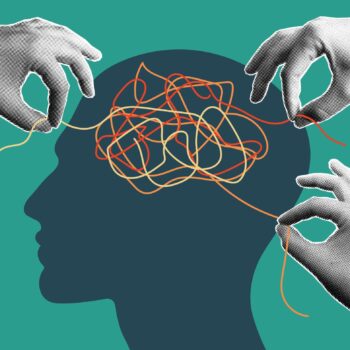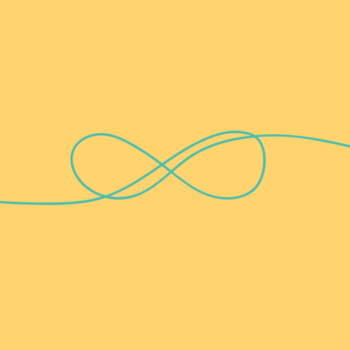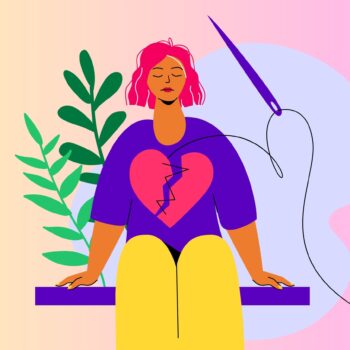New Year, Same Me
/ General : Litsa Williams
The What's Your Grief Podcast: grief support for those who like to listen.

In this grief podcast, Eleanor Haley, MS and Litsa Williams, MA, LCSW-C, the mental health professionals behind the website and book 'What's Your Grief', leave no stone unturned in demystifying the complicated and messy world of living life after loss. One digestible topic at a time, Haley and Williams distill topics ranging from grief theory to coping. Grief is sad and confusing, but your grief support doesn't have to be. You can listen here by using the player above or listen and subscribe wherever you get your podcasts.
Below we have provided a transcript of the episode.
Episode Transcript
Hey and welcome to our first episode of the What's Your Grief Podcast for the 2023 year. It's a little delayed but Happy New Year Litsa.
Thank you very much. Happy New Year. I know I looked down to check the date and it it seems almost impossible that we're at the 12th.
I know. I feel like it's been really hard to get on track. Like, usually I'm like Oh okay. Hit the ground running, not that I actually hit the ground running in any sense but, you know, I feel like I get it back into the swing of things a lot more easily in the past. Maybe that's just me hindsight. But this year, it's been a bit rough getting back into things.
Yeah. Yeah. I totally agree. I mean, I do feel like part of it has been that I came down with the flu. And the flu that won't go away. And so that, I just felt like it has eaten up a lot of my time. But yeah, it just genuinely feels like that. I try not to get sucked into too much of the New Year's getting all organized, new year new me things. But I (I) do feel like this year, more than ever, I am farther away from any of that diving into the New Year Strong.
You know, I feel the same way and I don't know what it is. (I) And I agree I don't really buy into resolutions, and you know, getting to the gym on January 2nd. But this year, I did feel because, maybe because, I took a bit of a bigger step back over the holidays to spend more time with family and things like that. I just felt the necessity to get back on track once (once) the holidays were over because I had fallen behind and gotten very disorganized, so I felt like this necessity. But I agree. I actually, like, really unexpectedly on New Year's Day, kind of had a bit of an emotional breakdown. Because I think I was expecting to feel like okay, you know, no big deal. Like, New Year getting back to work tomorrow, let's get a little organized. And for some reason, I just felt like I didn't even know where to begin. Like, the task just felt really overwhelming. And I don't know I wasn't expecting that. But then, when we talked to some people in our Griever Community, they were all saying similar things. Like, the new year really hit them in a way that they weren't expecting. And that the idea that you're supposed to get on track really feels at odds with the feeling that you don't even know how you would possibly even begin that task.
Yeah. I think that that's it. It's sort of this amplified version of, you know, when people really talk about struggling with, like, Sunday night before having to go to work the next day after the weekend. I feel like New Year's is like that times a hundred.
Right.
Suddenly feel like oh wait tomorrow is like the start of not just a new week but a new year. And there should be some sort of grand, I don't know, plan, or you're just facing it. And I, all the messaging around, whether it's resolutions or just that idea that we should have been self-reflecting about what's in and what's out for our, what we're leaving behind and what we're taking with us. All those things. I just think it's just messaging everywhere around that that pressurizes the idea a little bit of New Year's. And then, I think, it left a lot of people in that place of feeling like oh wait, here I am same same messy stuff as yesterday.
Yeah. I think for me too. I don't know. I think the winter's kind of hitting me now a little harder than it was before. It, which is always typical after the holidays, like you have a lot of busyness. Well, we do personally, we celebrate Christmas and so we have a lot of busyness leading up to that and a lot of anticipation and things like that. And then after that it's just like okay. Now it's gray and dark and cold and winter and all I want to do is (is) sleep. So, I think, winter started to hit me hard. And I (I) think on New Year's, one of the things that was really bothering me is that I wanted to feel like okay I'm gonna, like, at least get organized for work or start being a little more structured whatever. Whatever my thought process was. And I think the thing that was really bugging me is I was just kind of saying to myself like no you won't, you know. Like, you're not, you say this all the time and you never do. And just like not believing myself. And like, I'm not saying this in a sense that I want you to be like Eleanor you should believe yourself because actually, like, where I am right now, I shouldn't believe myself. What I should do is set more realistic goals.
Well, it's so funny that you said that. I mean that's like, I unsurprisingly was not about to say Eleanor you should believe in yourself. What I was about to say was that I actually just listened to a podcast with a woman who has done a lot of research around fresh starts and new beginnings, and it was obviously unsurprisingly around kind of this New Year's thing and how we have this idea of resolutions. And one of the things that she talked about was how New Year's is so appealing because we as humans like we love the idea of a fresh start. And we love the idea of being able to say oh that was the old me who couldn't do certain things but now it's the new me and the turn of a new year is perfect for that because you can be like oh 2022 me was not able to get organized at work but 2023 me I am gonna be like super organized. And I'm gonna go to bed early, and I'm gonna get up early, and I'm gonna like I'm somehow a new person. And one of the things that she was saying that I think reinforces, you know, things that (that) we all know but maybe don't always put into practice, is that idea of like no we didn't actually change from December 31st to January 1st. Like, we are still in fact the same person that we were. And maybe part of the process of, you know, growing in a New Year shouldn't be trying to set ourselves up for the things that just kind of like run contrary to who we are. And instead being like a little more self-compassionate to be able to say okay, like, here's who I am, here are my strengths, here are my weaknesses. Here are the things that are realistic and here and how can I instead of trying to turn myself into this person that I'm not, just be a little kinder to myself and try to set my (my) goal, you know, it's not like I'm not gonna have goals but maybe I'm gonna set them a little more gently and in away that's aligned with who I actually am.
Yeah. And while you were talking about that, I was thinking about how talking about the idea of like the 2022 me and the 2023 me, I think it's interesting when you think about grieving people, because they're often thinking oh the 2021 me, before my loss was way better. You know what I mean? So it's, like, kind of reversed a little bit. So it's hard to look back on the person you were last year and think I'm going to be better than that because that's like I want to go back to that. That was before my loss. Like, I feel like I was in a much better spot. I'm not saying always, that's not always true. Many people do not want to rewind a year or two years. But I do think it is common for people to feel like the person I was before my loss was much more, maybe feeling better emotionally, or much more having things together, or believed in things that (that) now I feel very confused about, and so on. So I do think it's interesting when you're grieving because it might be hard to even know where you want to head at this point.
Yeah. And because you feel like you should be able, like, I have never been, (I, I've) I've never been a morning person. I've never been somebody who was good at going to bed on time, you know. I can't, I could theoretically set a goal of saying, like, I want to be somebody who like goes to bed early, and gets up early, and does one of those miracle morning routines and whatever. But I can't actually even picture that of myself, really, because that has just never ever been me. So I, like, might set it as a goal but part of me maybe always realizes that's a really unattainable, feels like a really unattainable or really overshooting goal. But if it's something were, like, no maybe, you really were before your loss somebody who was like great at getting up early and being motivated to go to the gym and like do all of these things and grief has made that feel incredibly hard. It can feel way more frustrating when we, like, can't get back to that before person even in small ways. Like, you know, you were mentioning big things, like, just our values and priority, you know, and other certain things. But sometimes it's the huge ones and sometimes it's the little ones. But I think you're right, that sometimes we beat ourselves up more if we know we used to be able to do something and now we feel like we can't get back to that. It almost feels worse.
Yeah.
That makes sense.
No, I, I, yes it does. And I (I) think something that I'm just, from grieving myself, you know, and from working in grief and then from just being a human, one thing that I really want to be better at is just redefining what it would mean to make progress or what it would mean to have a little success in my day. Because I do think that I (I) feel unproductive. I feel like I can't get things done. I feel like so many things and I (I) think that's because I'm setting the bar like way too high for myself and this is not, like, saying like oh make a bunch of excuses for yourself and just let yourself off the hook. Like, I, you know, I (I) need to have some goals, and some to-do's, and some structure, some things I need to hit, but I should be a little more realistic about what those things mean. And this is something we talk about in grief all the time. Like, redefining. Redefining hope, redefining success, redefining progress is something that really is a necessity because you're not just gonna wake up one day and be the person you remember being before whether you have a realistic view of who that person was or whether it's an idealized idea or the person you think you're going to be when you feel better. Like that's just not how life actually works.
Yeah. And noticing the things that you are doing to make that progress, I think is especially important and it's easy to miss. I think, when we're so fixated on who we used to be or where we're trying to get. That sometimes, the little things we are doing are getting lost. And I know for me, even just going back to that organization of the day or getting things accomplished, there are so many times where I get lots and lots of things done during the day. But because they're not the two things I really wanted to get done or because I'm so fixated on the two things that I didn't make it to or like get to that, I completely ignore and overlook the things that I actually did accomplish. And I just focus, you know, it's that focus on the negative that our brains naturally do. And I think that, that in grief can come up so frequently as well is you set up this idea of like okay you know this has been so hard butI'm gonna do all of these things. And then even though you do a big portion of them, right, you focus on the things that you missed or that you didn't accomplish.
Yeah. I think noticing and just being in the present, being mindful, like, you hear people mindfulness has become such a buzz word. You hear people talk about these, you know, all the time. But I really do think that they are very important things, I'm learning but also very difficult things even though they seem so simple, you know. So I do think noticing, giving yourself a pat on the back for the few things that you have done right. Like you said, rather than giving yourself a hard time for the things you don't. Maybe that's not something you are good at doing in the moment. And maybe you know that and so you say, like, at the end of the day I am going to make a checklist, in the beginning of the day, and I'm going to check the things off at the end of the day, and I'm going to give myself credit for those things. I'm gonna congratulate myself for doing those things. We talk all the time about in grief, about congratulating yourself for those small steps. And I just think also with (with) that self, that how you talk to yourself about things, you know, not giving yourself a hard time, that's something I (I) try and remind myself a lot of time when I'm doing things that feel like I'm wasting time and not being this good little worker. But that are good for me in general. And I think we can be really hard on ourselves about, you know, oh you know, especially in grief like we have, we should be focusing on our loss. We should be exploring it and working through it. We should be, we should be taking care of all the odds and ends we have to take care of. Because loss causes a lot of stress, and secondary loss, and new responsibilities, and things like that. We should be doing all our baseline stuff that we were doing before. And we don't always allow ourselves to do the things that make us feel good. Or if we do those things, we feel bad about it. So like, an example for me is sometimes I'll lay in bed an extra 15-minutes with my three-year-old and it's like the best 15-minutes of my day, but the whole time I'm like I should get up, I should get up, I should get up. So something I'm trying to remind myself of is to just say No, I should not get up. Like, these are, this is the thing that (that) brings me a little bit of joy. And I have a lot of things that I have to do when I get up that bring me, let me just tell you, no joy. Like, right. I, that sounds depressing, but you know, it just is what it is. We're adults, we have responsibilities. And not all of them are fun and not all of them make us fill our cup up, you know.
Exactly. Well, you know, I just I posted on Instagram the other day. This (this) post that we've posted before, and I think actually, I put it in the newsletter too, that says, you know, when you remind yourself that grief comes in waves, remind yourself too that, like, happiness also, and still comes in waves. And a number of people, and I (I) asked people to leave a comment about some of their happiness things that have come out. And you know, it was interesting a lot of people did comment with things. But there were then some people who were just like I'm waiting for happiness. I don't know when I'm gonna have a happiness wave. I don't, you know, when will that happen. And one of the things that ended up kind of being that discussion was prompted from the fact that I posted that because I had the flu and I was feeling miserable. And I was definitely not in a place where I was feeling particularly connected to anything that was joy or happiness related. But was making an effort to try, to really look for things. To kind of anchor myself to that. Did feel like small things. And again, I guess this is in its simplest form right you can call it gratitude. I'm not sure if it was fully like me seeking gratitude. But I think it was me trying to be like okay, this week has been miserable and also I binged a couple of really great shows while I had my flu, and as I posted on Instagram I am, (I) I do experience happiness about living in the golden age of television and like having the flu in 2023 and not 1823 when, you know, those sorts of things. But I do think it, like, it takes practice to do that. And it's the idea of, like, experiencing happiness especially in grief. Like, it's not gonna be the same immediately as it was before your loss. And part of it is going I just need to appreciate these tiny moments because it helps me to get practice being open to them and to seeing them and feeling them and leaning into them instead of rushing past them and going oh my gosh I'm so busy that I can't spend 15-minutes in bed with my daughter because I have to rush into the rest of my day. And then, you know, we we need those moments more than ever. And so, it's like we have to really hang on to them no matter what they are.
Yeah. I love that metaphor. I guess it is, right? Metaphor? But I think, that the thing that is important like you said, is that sometimes the waves can be (can be) really tiny. Like it's not necessarily the wave you're going to catch and ride all the way into the shore. It might just be a wave that passes pretty quick. But that is sort of what life is. Like, I think when we talk about happiness, the way I always grew up with this idea, that happiness was a state that you would achieve. And then have. And that's just not, like, what (what) it is. You don't get to the the top of the hill and say I'm at the happiness top and now that's where I'm going to stay. Like, I mean, I can't say that that's not what's going to happen for you. If that's what happens for you, I am so happy for you, that's wonderful. And if that's how you feel about your life, and then good. But I do think for a lot of people, it doesn't feel that way. It feels like I'm having moments where I feel okay, and I'm having moments where I don't feel okay. I'm having moments where I feel joy, I'm having moments where I'm feeling absolute misery. And it's just, this is what life is for a lot of people, is this ebb and flow. And I (I) do think there are times when you're feeling (more of the) more of this distressing side, right. That seems like all you're feeling. And hopefully there are times in your life where you feel like you're on the other side of that. But I do think that the idea of it being sort of a wave and something that that can be temporary and passing but will come again is a nice idea. You were talking about feeling like you needed more of these things and wanting to find them and I do think that that's something. And people asking you in the comments, like, when is that going to happen for me and I think that this is something that for me personally, in my grief (when I) when I'm feeling really low about grief and loss and yearning and missing people in the past, something that personally brings me comfort is just thinking about how I can find that joy and happiness through kind of the connection. And actually this is an article I just wrote last week and posted on the website where I was talking about how for a long time I felt like I was just living this, like, in spite of life. Where everything was happening, just in spite of my mom not being here, like, life was going on despite the fact that, like, something terrible had happened, and everything just felt very much like yes-but, you know. Like, YES I'm ha, I'm pregnant with my first child BUT, you know, my mom's not here. Everything felt very much like I can't believe we're still moving on in spite of the fact that my mom is gone. And I think when I truly started to feel that continued connection with her and continue bond and maybe a little more sense of comfort in her presence was when I started to feel like I was living many things in my life because of her. And for me that was when I (I) was pregnant when she died, so when my first daughter was born I started doing a lot of the things I was doing as a mother because of the way she was my mother. And because of the way she raised me. And because of the fact that I just simply wanted to be close to her. And so, I feel like for me that was one point where I was able to start to see some of those positives. And I, that was one of the things I ended the article with, challenging people. Like, if you're feeling like you're really missing that connection maybe one thing to do is to notice the things that you do, or (or) if the people around you do, because your loved one lived and died.
Yeah. I think that, that I mean the, being able to shift that and see that, I think again it's something that takes about practice. It feels like a weird word, but I do think it feels almost like practice in shifting our focus in some way.
Yeah.
And because it does, and in your article I thought this when I read it, like it's, they (they) are sort of two sides of this same coin.
Definitely.
And I think that's one of the things that's so, that's so tricky about it. It's that, you know, it's easy to slide back and forth between those, you know, each side of that. And it's okay, I think it, and that's the other thing, it's like, it's okay to slip back and forth between those sides. Like, there's not always going to be the moment where recognizing of, because of brings all the comfort and everything. And there's not still a little bit of this like I'm just pushing through in spite of...
Yeah. Absolutely.
Yeah. And so it tastes just like a little bit of work and recognizing it's not the flip of a switch that makes everything feel rosy and happy, and is a huge happiness wave that's gonna surge you to the shore. Sometimes it's still these like ups and downs.
Yeah. And I (I) think that part of it is just letting it exist, you know. Letting it all exist at once and not telling ourselves we shouldn't be seeing it or (or) actively seeking it. And I think that in a way goes back to some of that talk that we have with ourselves, you know, like oh I shouldn't be laying in bed with my daughter because I should be doing this other thing but (but) no, I'm going to let this moment exist too because this is important in the bigger picture. So I do think just sometimes stopping ourselves and letting things be. Like, I know a lot of people talk about the first time they had a moment where they felt joy or laughter or happiness after their loved one was gone and they immediately felt guilt and I'm not saying don't let the guilt exist but also let the joy exist too. Don't let one thing cancel the other out.
Yeah. And (and) to, you know, and I think with that guilt to (to) sort of interrogate it a little bit, you know. And not dismiss the guilt and say like oh the skill, it's always important to notice the things that are coming up and not just try to push feelings away but to (to) recognize, I think. There's a lot of layers to guilt that's like a whole another conversation for another day. But I think that the thing that's (that's) interesting sometimes is like it can be the thing that makes us close the door to a feeling like connection or joy or happiness because somehow we feel like oh I shouldn't feel this. This is disloyal, or a betrayal, or it's wrong for me to feel guilt I mean to feel happiness. It's wrong for me to feel happiness if my loved one isn't here to feel happiness to. And sometimes being able to recognize that those feelings aren't always coming from, they're coming from a place of the confusion of early grief. Often they're coming from a place of the fact that we haven't settled in yet to what it looks like and feels like to live a life where joyful moments are always a little bittersweet and that's okay. It's, but it's not a betrayal and it's not being disloyal and we are going to live these moments forever without that person or after this loss. And so part of it is figuring out, you know, how we're able to stay open to those moments.
Yeah. Like, (like) so many things are two sides of the same coin and that's just how grieving is. Living after someone you love has died, it just means often feeling like you're living things that's seem opposite even though they might not be. Because, you know, it's like when you're in a moment where you feel, like, joy let's it's hard to feel, not feel, I wish my loved one was here, right.
And I think that that's where, you know, when people were asking that question of like when is my happiness wave gonna come? I, you know, I think if you're setting yourself up to think that those happiness waves are going to be completely free right any sadness. Then you set yourself up to always feel like I'm not there yet. I haven't figured out how to be happy after my loss. And part of it is being able to say no, I can be holding the happiness and experiencing happiness and still have that twinge of those other feelings that are always part of it. And that doesn't invalidate your happiness. It's just that it looks, it's shaped a little bit differently now. Because there's always this little space where we wish our loved one was, and so that it kind of always sits with us somehow in our happiness.
Yeah. Wow, we've gone a far away from starting talking about being hard on ourselves about productivity in the new year. And I (I) have to tell the listeners that we had a totally different topic planned for today. But now we've just talked about this long enough that I think maybe we need to save that topic for another day. What do you think?
Yes. I think that we do. And I think that this, I think that this maybe was the better and more appropriate topic for getting into a new year anyway. I think probably the reason we went on about this is because it is, yeah. I think it's just present for a lot of people this time of year, how we're (how we're) assessing our (our) past year and our forward year. So hopefully you can do it with maybe a little bit more self-compassion.
Yeah. I think that is one of the big big points that it boils down to, is having a little bit of kindness and compassion and going easy on yourself a little bit. It is okay to go easy on yourself.
Yeah, you know.
Okay. Well and actually this, I wasn't, I probably, in really aligned with things that we've talked about in recent weeks, how we're bad at talking about different things we're doing in different places. I probably would have forgotten had we not gone on this tangent of the topic to mention that next week we are doing a free webinar on grieving in the new year. So I'll include the link to that in the show notes down below. So if you're hearing this before January 17th, there is still time to sign up for it down in the show notes. The link will be there if you want to attend and we'll be talking about, it won't be just a rehash of what we've just talked about now. It'll be some other much more constructive ideas, About thinking about your own journey into the New Year.
Yes. And this event is kind of a part of our what's your grief community that we're opening up to everybody. So with that, I will remind you that we have a little community where we do a lot of things. We have a lot of like forum type of discussions but it's much more than that. We also do a lot of events of all different types, some very conventional, some a little bit outside of the box, a lot of creative stuff, a lot of psycho-education stuff. All sorts of things. So we'll provide a link to that as well. And as always, we do invite you to message us with your questions or topic suggestions for the podcast. We can be reached on social media, mostly on Instagram. You could tweet at us if you felt so inclined and our username is @whatsyourgrief, or you can just send us an email at whatsyourgrief@gmail.com
We wrote a book!
After writing online articles for What’s Your Grief
for over a decade, we finally wrote a tangible,
real-life book!
What’s Your Grief? Lists to Help you Through Any Loss is for people experiencing any type of loss. This book discusses some of the most common grief experiences and breaks down psychological concepts to help you understand your thoughts and emotions. It also shares useful coping tools, and helps the reader reflect on their unique relationship with grief and loss.
You can find What’s Your Grief? Lists to Help you Through Any Loss wherever you buy books:




